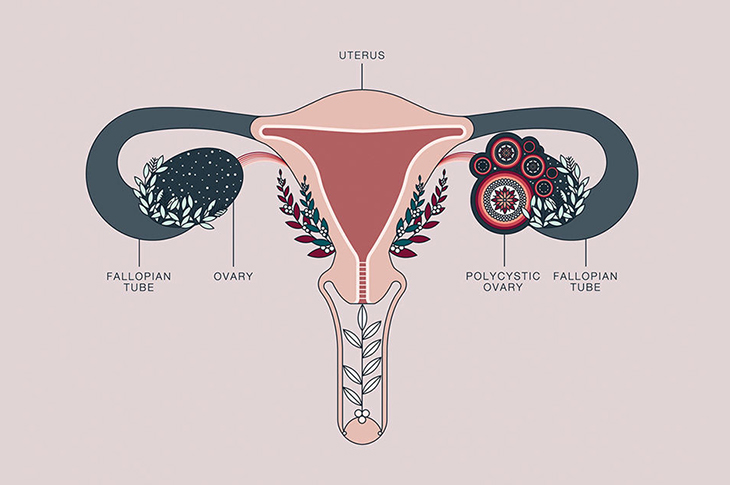Polycystic Ovary Syndrome (PCOS), one of the most common hormonal disorders in women, is not limited to irregular menstruation; it can bring many problems ranging from skin issues and weight control to infertility and mood changes. Early diagnosis and a holistic treatment approach are crucial to preventing long-term complications.
What is PCOS?
PCOS is a syndrome characterized by the formation of multiple small cysts on the ovaries and hormonal imbalance. However, cyst formation may not always be observed. The main problem is the disruption of ovulation and an increase in male hormones (hyperandrogenism).
Most Common Symptoms
- Irregular periods (delayed, very light, or very frequent menstruation)
- Excessive hair growth (face, chin, abdomen, chest area)
- Acne and oily skin
- Hair loss (male pattern)
- Weight gain and difficulty losing weight
- Ovulation problems (infertility)
- Mood changes (anxiety, tendency to depression)
Note: Not all symptoms are seen in every woman. PCOS symptoms vary from person to person.
How is Diagnosis Made?
The diagnosis of PCOS is based on the presence of at least two of the three main criteria (Rotterdam criteria):
- Absence or infrequency of ovulation
- Elevated male hormone levels (clinical or laboratory findings)
- Detection of multiple small cysts on the ovaries by ultrasound
Additional tests may include:
- Blood hormone levels (LH, FSH, testosterone, DHEA-S, etc.)
- Insulin resistance test (HOMA-IR)
- Thyroid and prolactin levels
- Abdominal and pelvic ultrasound
What Causes PCOS?
- The exact cause of PCOS is unknown, but several factors play a role:
- Genetic predisposition
- Insulin resistance
- Obesity
- Hormonal imbalances
- Environmental factors (stress, sleep disorders, toxins)
Insulin resistance triggers both weight gain and suppresses ovulation, creating a vicious cycle.
How is PCOS Treatment Planned?
There is no single treatment for PCOS. The treatment plan depends on the patient’s symptoms, desire to conceive, and age.
1. Lifestyle Changes (First Step)
- Regular exercise (at least 3-4 days a week, 30 minutes of walking)
- Balanced, low-carbohydrate diet
- Adequate water intake
- Sleep regulation and stress management
- Losing even 5-10 kg can improve menstrual regularity and ovulation.
2. Medication Treatment
- Birth control pills: Regulate menstruation, reduce hair growth and acne
- Metformin: Reduces insulin resistance, supports weight loss
- Antiandrogen drugs: Control excessive hair growth
- Ovulation induction drugs: Used in patients wishing to conceive
3. Skin Treatments
- Laser hair removal (for excessive hair growth)
- Skin cleansing and dermatological treatments for acne
4. In Vitro Fertilization (IVF) and Advanced Reproductive Techniques
Preferred when ovulation treatments are ineffective or other infertility causes exist.
Holistic Approach to PCOS
Dr. Engin Sarıca’s holistic approach includes not only hormonal treatments but also lifestyle changes, stress management, nutrition regulation, acupuncture, and natural supplements such as:
- Myo-inositol and D-chiro-inositol supplements
- Zinc, Omega-3, Vitamin D to support hormonal balance
- Herbal teas (cinnamon, ginger, fennel) may be supportive
Coping with PCOS: Psychological Aspect
- PCOS is not only a physical condition but also has psychological impacts:
- Distorted body image
- Decreased sexual desire
Constant weight fluctuations leading to self-confidence issues
Therefore, supportive therapy, counseling, or group work can contribute positively to treatment.
Long-term Problems Caused by Untreated PCOS
- If left untreated, PCOS can lead to:
- Type 2 diabetes
- High blood pressure
- Metabolic syndrome
- Endometrial hyperplasia (uterine lining cancer)
- Infertility
- Depression
Conclusion: PCOS is a Manageable Syndrome
With accurate diagnosis, personalized treatment, and a holistic approach, many problems caused by PCOS can be controlled. Dr. Engin Sarıca provides both medical and lifestyle counseling for women with PCOS, aiming to help them live healthier and more balanced lives.



